In the News
Podcasts »
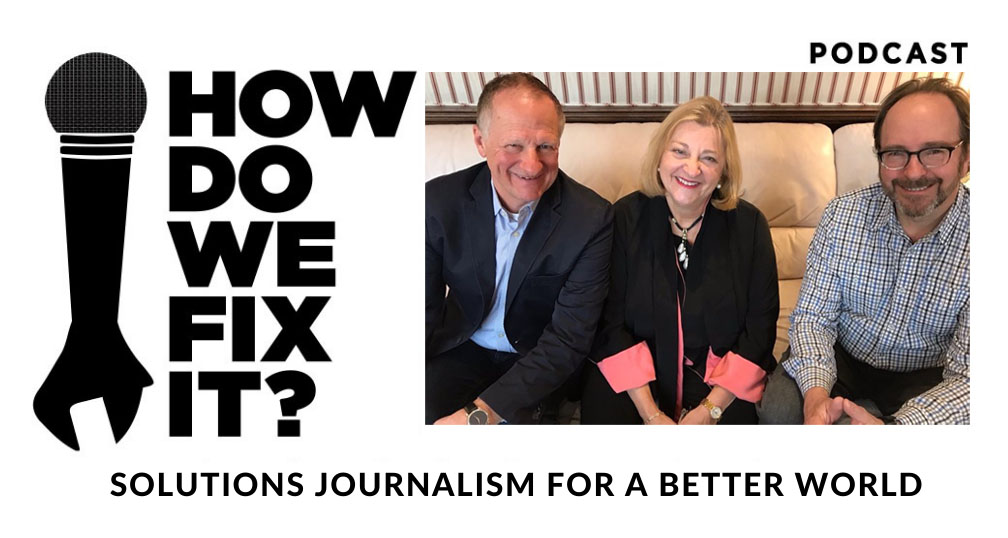
America’s Leadership Crisis: Davia Temin — How Do We Fix It? podcast with host Richard Davies
To listen, Click Here.
Companies: Crisis and Common Ground — Let's Find Common Ground podcast with hosts Richard Davies and Ashley Milne-Tyte.
To listen, Click Here.
Communicating with Authority and Compassion in Crisis or Opportunity — Voice America’s Out of the Comfort Zone with host Wanda Wallace.
To listen, Click Here.
Leading Through Crisis & Chaos — Know the Rules of the Game® Podcast with host Desiree Patno & Special Guest Davia Temin.
To listen, Click Here.
Temps at the Top — Marketplace with Kai Ryssdal.
To listen, Click Here.
You Can Eradicate Sexual Harassment in Your Organization — Monday Morning Radio.
To listen, Click Here.
Leading in a ‘Me Too’ Era
In the era of #MeToo, leaders need to know what to do to prevent the problem in the first place.
To listen, Click Here.
...more »
Temin and Company is often quoted in print, broadcast and social media on topical issues as well as industry trends.
Following is a list of links to those articles, beginning with the most recent.
It’s time to face the ‘new normal.’ Here’s how we can begin
Caroline Fairchild, LinkedIn’s Working Together, April 15, 2020
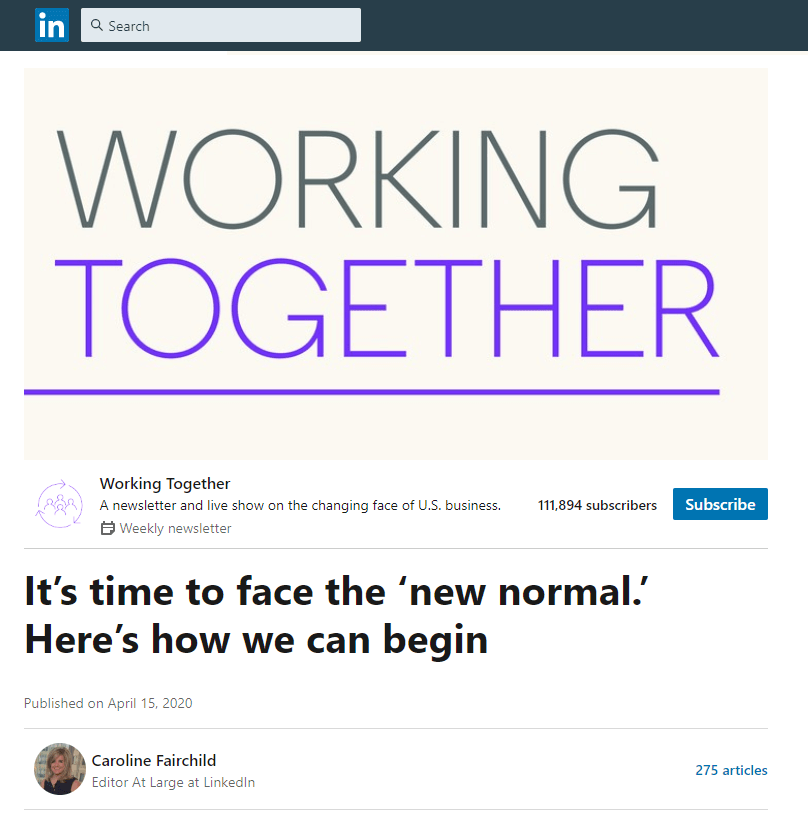
On the night of March 11, Anna Maria Chávez made an urgent call to her CEO. Chávez, who was the chief growth officer of the National Council on Aging, was watching President Trump announce to the nation that travel from the United States to Europe would be suspended. She told her CEO that the council needed to move its nearly 100-person team to remote work, and they needed to do it now. The next morning, no one on the non-profit’s staff was in the office.
Chavez’s quick reaction didn’t come out of nowhere. It was a skill she developed while working as a policy advisor to the Arizona National Guard early on in her career. And that quick thinking is exactly what crisis expert Davia Temin says every leader — and every worker, really — needs to embrace right now.
Whether you’re the CEO of a large organization or an employee who is part of a smaller team, it’s likely that your job looks very different right now. As we settle into this new normal, the quicker you can get out of denial that your industry, career and role have changed, the better off you’ll be.
“The first thing we do is that we say this can’t be happening or it won’t be that bad or no one will notice and it is just a cascade of denial,” Temin said. “The longer you wait in denial, the worse it gets where you can’t put in fixes anymore.” […read more]
How companies are confronting the unparalleled uncertainty of the coronavirus crisis
Jena McGregor, The Washington Post, April 10, 2020
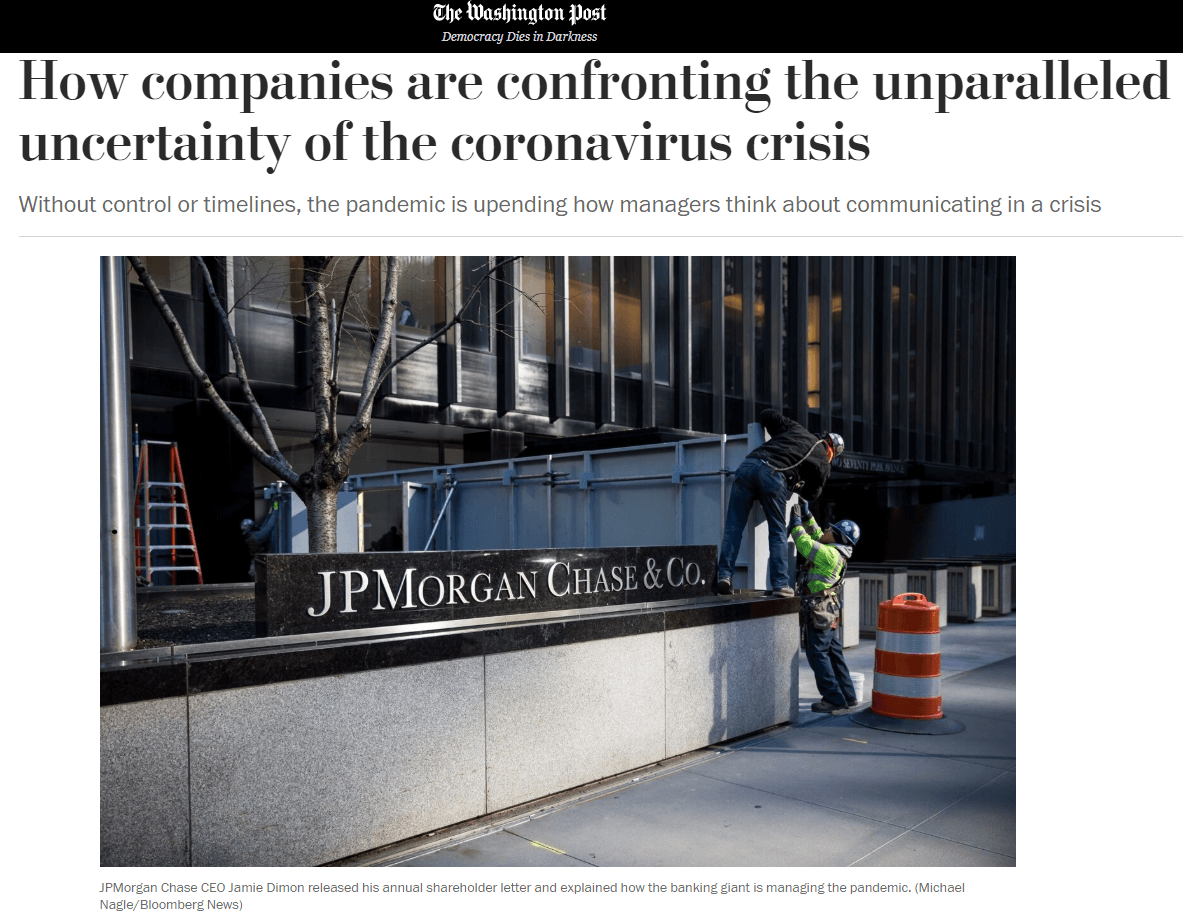
When JPMorgan Chase CEO Jamie Dimon released his widely read annual shareholder’s letter, he moved most of the typical charts and discussion about the company’s performance to the end, focusing instead “on issues that relate to our current crisis.”
His 23-page letter explained how the banking giant was dealing with the coronavirus pandemic, detailing different economic scenarios, explaining what it’s doing for employees and customers, and discussing the strength of its liquidity and balance sheet. But Dimon also wrote, “We do not know how this crisis will ultimately end, including how long it will last, how much economic damage it will do, or how fast or slow the recovery will be.” The “actual new crisis,” Dimon wrote, “while it shares attributes with what is being stress tested — is dramatically different from the expected.”
In virtual boardrooms across America, managers are confronting unprecedented uncertainty as they try to communicate — with their investors, their employees and their customers — amid the all-consuming scope and scale of the pandemic. Finely tuned scenario plans are being upended, project timelines are getting cast aside and conventional playbooks are proving insufficient as managers face a health and economic crisis with no modern parallel.
In some cases, “we are no longer in crisis management, we are in chaos management,” said Davia Temin, eponymous founder of a reputation and management consulting firm. “You can do certain things and mitigate a crisis. This is out of our hands to some degree now.” […read more]
‘Sometimes the Crisis Makes the Leader’: Andrew Cuomo and Five Lessons on Leadership
Kathryn Dill and Te-Ping Chen, The Wall Street Journal, April 8, 2020
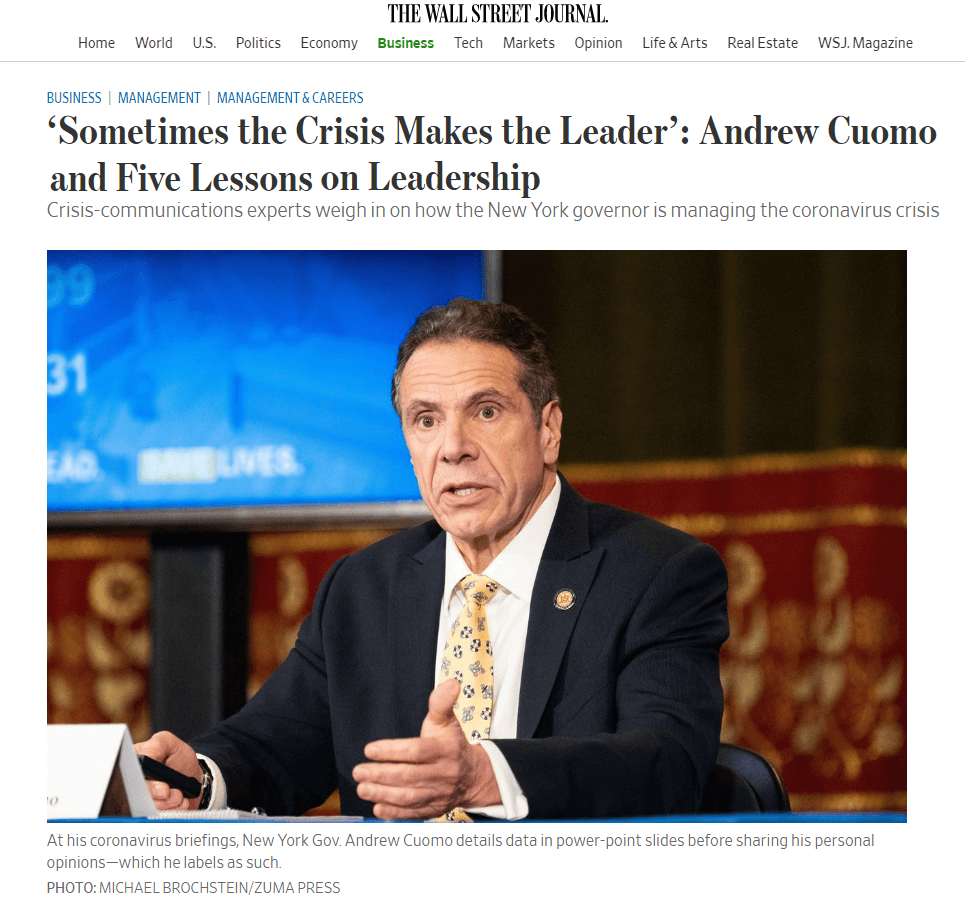
The nation is watching how New York Gov. Andrew Cuomo is handling the coronavirus outbreak, and it likes what it sees. Here’s how five crisis communications experts rate and react to his leadership style.
What America needs now is a field general, says Davia Temin, head of Temin & Co., a crisis-management and reputation consulting firm.
Someone who gives you facts, statistics, someone with a thoughtful, no-holds-barred, unvarnished approach. I’m not sure that Cuomo makes a perfect peacetime general, but he’s exactly what we need in a wartime general. He’s informed, his sleeves are rolled up, he’s walking the talk. He’s not abrogating the 6-foot rule just because he’s president or prime minister.
His brother’s situation has totally humanized him. It’s both intimate storytelling and authoritative, and that’s a very hard line to walk. I’m not sure I’d want to work for him—the pressure would be unholy—but he’s taking responsibility. He’s personally been trying to get ventilators, you get a feeling this is a guy in it up to his eyeballs.
In this kind of crisis, dysfunction kills. He has engaged our trust very quickly, and we need it more than we ever have, really. […read more]
A Death at Jefferies Highlights Urgency of C-Suite Backup Plans
Jeff Green, Bloomberg Quint, March 29, 2020

Like all aspects of society, the rules of the C-suite are being rewritten under the pressure of a deadly pandemic. Professionals who help companies ensure leadership continuity say the coronavirus crisis has added a new urgency to their work. Some say clients are mulling whether to further isolate key executives; other clients have made private jets a given for top leaders who still travel; some have scattered top lieutenants across the globe as an added precaution. At least one is poised to hire a new chief executive officer largely by video interviews.
“Just as the virus cascades deeper into a population, so now too does your succession plan have to cascade into the population, into the hierarchy,” said Davia Temin, founder of New York crisis consultancy Temin & Co. And while bosses like JPMorgan Chase & Co.’s Jamie Dimon — a cancer survivor who just had emergency heart surgery — have a good plan in place, today’s coronavirus crisis means “you have to think of the succession to the succession.” […read more]
Managing Your Bank’s COVID-19 Communications in Social Media
Steve Cocheo, The Financial Brand, March 19, 2020
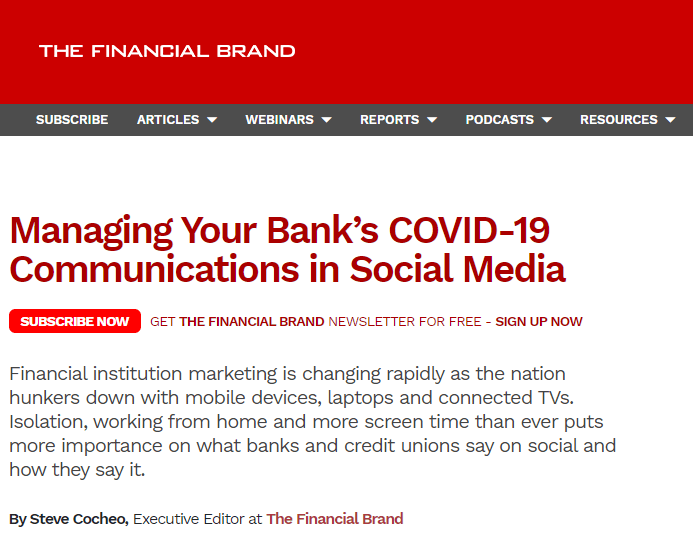
Financial institution marketing is changing rapidly as the nation hunkers down with mobile devices, laptops and connected TVs. Isolation, working from home and more screen time than ever puts more importance on what banks and credit unions say on social and how they say it.
Something that can be reassuring to both consumers and businesses is a demonstration that “we’ve got your back.”
“Banking institutions need to better communicate strength in uncertainty,” says Davia Temin, President and CEO of Temin and Company, a crisis management consultancy. “My suggestion is to channel Elizabeth Warren and ‘have a plan for that.’ Institutions might do well to showcase how much contingency planning they have done and how thorough it is. If the populace, the markets and the regulators believe them, life can be far less panic-driven.” […read more]
Is your board risk-ready?
Michele Wucker, Strategy + Business, March 11, 2020
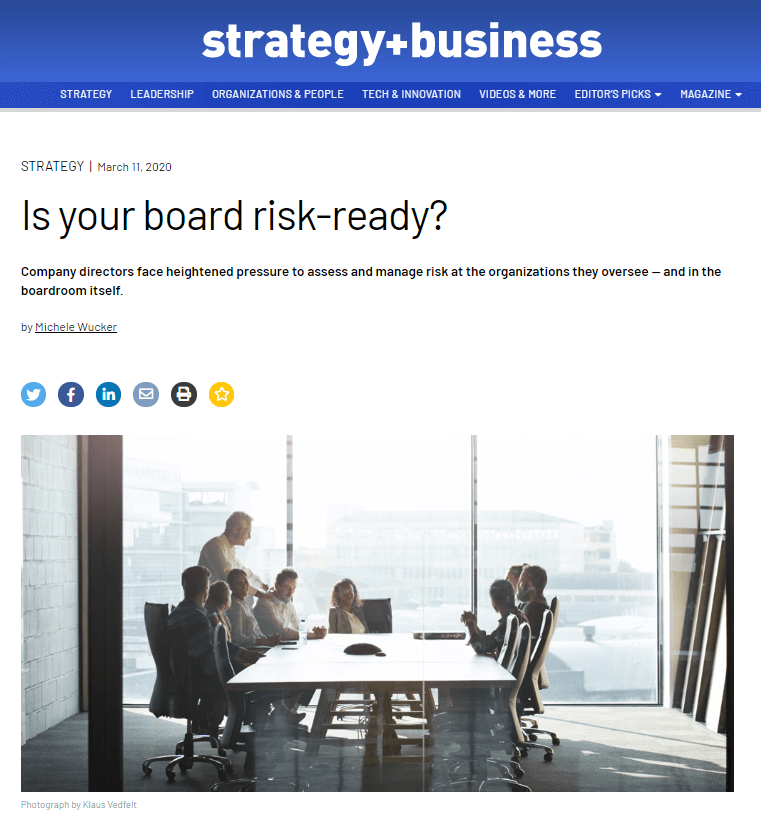
Your company’s board of directors is charged with reviewing all kinds of risks to the corporation. But how well prepared are its members to do so? How ready are directors to evaluate, communicate, and act on risks — and thus to better ensure that their companies are doing a good job? A great deal rides on the answers to these questions.
Understanding the risk attitudes of directors as individuals and as a whole can make all the difference if a risk materializes into a full-blown crisis. Davia Temin, founder of the New York–based crisis management firm Temin and Company, said it’s essential to understand and improve a board’s risk reaction dynamics during times of calm. “It’s better to fix the fissures on a board ahead of time because every fissure will explode in a crisis,” she said.
She recommends boards do an annual risk survey to determine how attuned different directors are to various risks. Crisis scenario games can shed light on differences among board members in their responses to stress and risks, and help board chairs to identify ahead of time which directors they might lean on most when — not if — a crisis hits. In fact, PwC’s 2019 survey found that the percentage of directors participating in crisis management tabletop exercises doubled since last year, from 28 percent to 56 percent. […read more]
Wells Fargo’s Duke Quits Before Turn in Washington Hot Seat
Hannah Levitt, Bloomberg, March 9, 2020 »
Wells Fargo & Co. Chair Betsy Duke resigned from the company’s board ahead of a dramatic congressional hearing set for this week, succumbing to the same political pressures that have claimed multiple former leaders of the bank.
The lender said Monday that board member Charles Noski will replace Duke as chair. Duke faced a growing chorus of calls for her departure after Democrats atop the House Financial Services Committee issued a scathing report last week on the bank’s response to a series of consumer scandals.
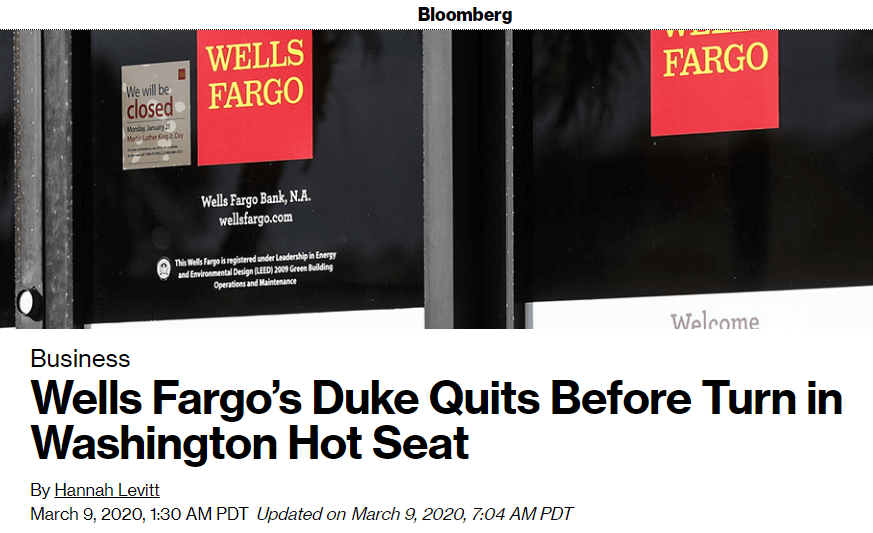 The latest set of hearings begins Tuesday with an appearance by CEO Charlie Scharf, less than five months into his tenure. The committee will seek his thoughts on next steps for what it calls “the bank that broke America’s trust.”
The latest set of hearings begins Tuesday with an appearance by CEO Charlie Scharf, less than five months into his tenure. The committee will seek his thoughts on next steps for what it calls “the bank that broke America’s trust.”
Scharf is preparing to answer questions on what he’s doing to get back in the good graces of customers, regulators and the public. He’s met with nearly half the House Financial Services Committee, including Waters, since taking over in October, people with knowledge of the meetings said.
He’ll be able to point to changes he’s made since taking the helm, including adding new leaders and settling past probes. And he can tout the bank’s recent announcements on minimum-wage increases, limited-fee bank accounts and lending to recipients of the Deferred Action for Childhood Arrivals program.
Scharf “can come on as a hard-nosed leader who is going to do the bidding of the public and fix things,” Davia Temin, founder of crisis consultancy Temin & Co., said in an interview. “America still loves a comeback kid.”
The board members faced a different task, Temin said. “It’s harder to be part of the problem and then the solution.” […read more]
Victoria’s Secret Faces New Sexual Misconduct Allegations
Jordyn Holman and Kim Bhasin, Bloomberg, February 3, 2020
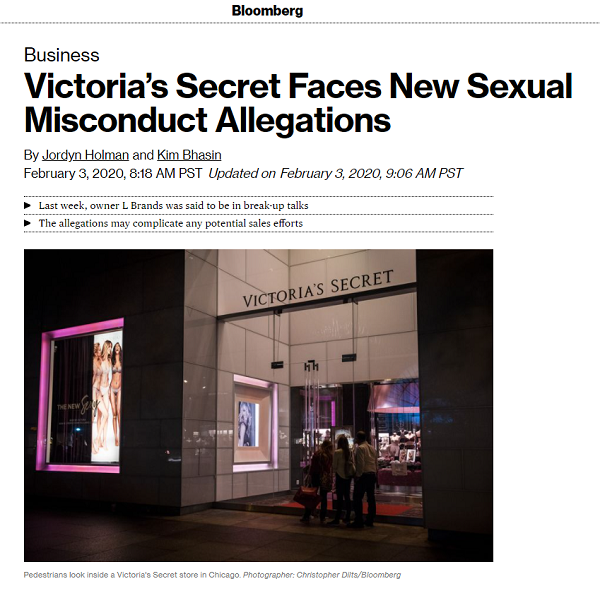
New allegations of sexual misconduct have surfaced at Victoria’s Secret as the brand tries to remake its image after years of scandal and slumping sales.
Female models and executives were bullied and harassed for decades at the lingerie chain, evidence of an “entrenched culture of misogyny,” according to a New York Times investigation published this weekend.
The revelations come days after reports that L Brands Inc., owner of the troubled retailer as well as Bath & Body Works, was in talks to break up the company and that longtime Chief Executive Officer Les Wexner could step down.
***
Davia Temin, CEO of crisis consulting firm Temin and Company, said the problems at Victoria’s Secret have become endemic, and it may need a new owner to survive. Patching up the brand by tweaking advertising won’t be enough, she said.
“Unfortunately, now Victoria’s Secret’s brand has gone to sleazy from sexy,” Temin said. “And no re-brand is going to fix that.” […read more]
Employees Speak Out—Against Their CEOs
Rachel Feintzeig, Charity L. Scott and Sharon Terlep, The Wall Street Journal, February 1, 2020
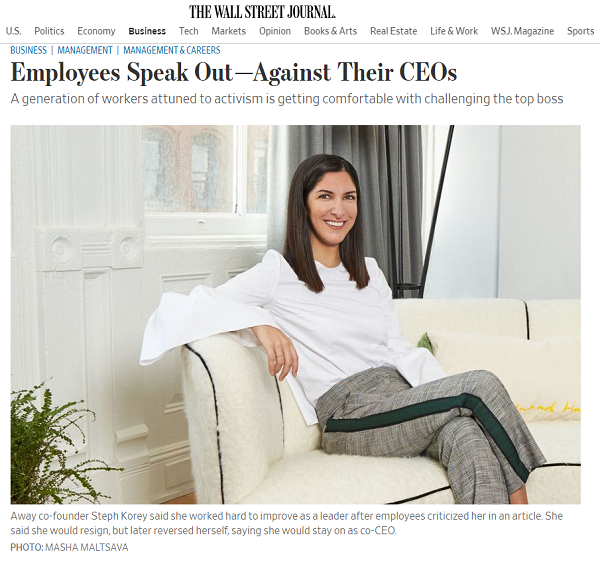
Chief executives routinely face barbs from investors and the media. Now some are dealing with criticism from a group closer to home: their own staffs.
Two recent workplace sagas—at online luggage seller Away and G/O Media, the publisher of former Gawker Media sites such as Deadspin and Gizmodo—highlight the more outspoken scrutiny that some leaders face from employees. At both companies, disgruntled workers led efforts to pressure their chief executives over behavior or decisions they didn’t like.
The top boss used to be more shielded from in-house criticism. With some exceptions, discontented employees tended to grumble among themselves or at a town hall meeting. They let labor leaders do the toughest talking, usually in pursuit of better wages or job security.
But at a time when digital forums like Slack and others are proliferating, workers aren’t just pressing employers to develop a stronger social conscience. They are taking leaders to task for their management style and, in some cases, calling for their jobs.
***
Companies are still trying to figure out how to handle crises born out of more openly critical employees, said Davia Temin, CEO of Temin and Co., a New York-based reputation and crisis-management firm.
“This is a new competency,” Ms. Temin said, “and I don’t think that it’s just a normal leadership competency that you learn in business school.” […read more]
Wells Fargo Quashes Hope That Its Scandals Are Nearly Resolved
Hannah Levitt, Bloomberg, January 27, 2020
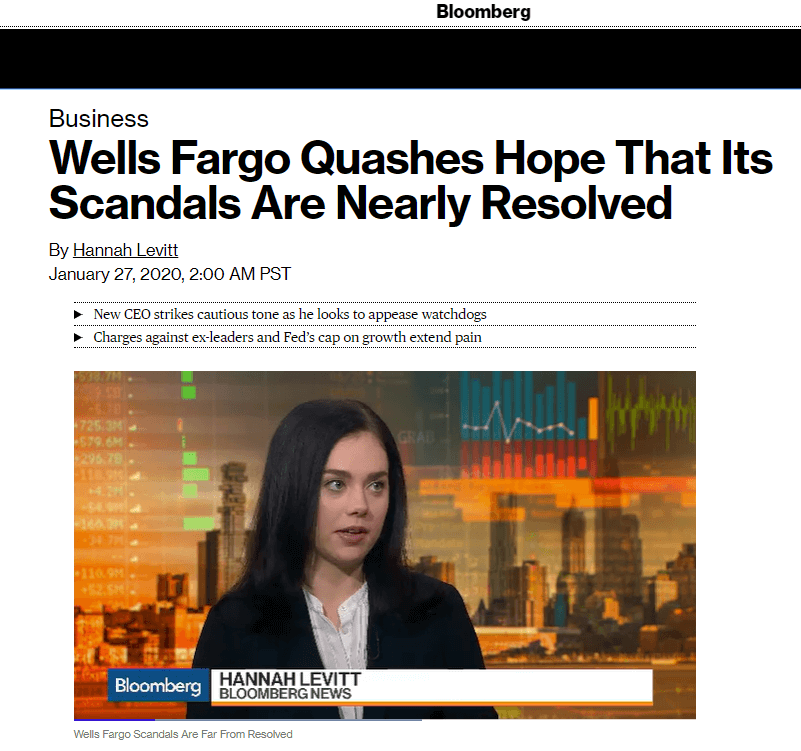
Wells Fargo & Co.’s finance chief was promising analysts they would be kept abreast of the bank’s efforts to resolve scandals when his new boss chimed in. “I just want to be clear, I’m not suggesting here that any of these public issues will be closed this year,” Chief Executive Officer Charlie Scharf said earlier this month. “The time frames will be driven by when we accomplish that work and when the regulators are satisfied by it.”
The firm has yet to reach settlements with the U.S. Department of Justice and the Securities and Exchange Commission after setting aside more than $3 billion for litigation in the second half of last year. And in its quarterly filings, the bank lists an array of other open-ended probes, investigations and sanctions including a Federal Reserve-imposed growth cap.
It’s a strikingly long tail for a scandal that began with the 2016 revelation that employees had opened millions of potentially fake accounts to meet sales goals, possibly overcharging customers by a few million dollars. That unleashed a public and political backlash that has kept Wells Fargo in a harsh light ever since.
“There’s this sort of free-floating anger and fury that’s out there in the populace, and anything that sticks its head up that’s a problem that isn’t resolved in the right way, it coalesces,” Davia Temin, founder of crisis consultancy Temin & Co., said in an interview. “That fury is magnificent — it is stunning in its destructive power.” […read more]
Podcasts »
Leading Through Crisis & Chaos
Know the Rules of the Game® Podcast: with host Desiree Patno & Special Guest Davia Temin.
To listen, Click Here.
Temps at the Top — Marketplace with Kai Ryssdal
To listen, Click Here.
You Can Eradicate Sexual Harassment in Your Organization — Monday Morning Radio
To listen, Click Here.
...more »



